Difference between revisions of "TF EIM Chapt6"
(→JFET) |
(→JFET) |
||
| Line 36: | Line 36: | ||
The semiconductor material of the gate is the opposite of the channel. Here the n-p (or p-n) junction is between the gate and the channel. | The semiconductor material of the gate is the opposite of the channel. Here the n-p (or p-n) junction is between the gate and the channel. | ||
| − | The JFET operates by reverse biasing the gate-channel junction (diode) so the gate current doesn't flow in the direction indicated by the circuit diagram symbol. | + | The JFET operates by reverse biasing the gate-channel junction (diode) so the gate current doesn't flow in the direction indicated by the circuit diagram symbol. This means that the current through the gate is small (nAmps). As a result the input impedance looking into the gate is high (M<math>\Omega</math>) for the equivalent circuit. |
=MOSFET= | =MOSFET= | ||
Revision as of 02:33, 5 April 2011
Field Effect Transistors (FET, JFET, MOSFET)
Properties
FETs differ from the bipolar transistors in the las chapter in that the current from a FET is only due to the majority charge carriers in the semiconductor while bi-polar transistors current is produced from both carrier types; electron and hole.
- higher input impedance than bi-polar
- less gain than bi-polar
JFET
JFET Junction Field Effect Transistor
In a bi-polar transistor you have a depletion region with mixed charge carriers
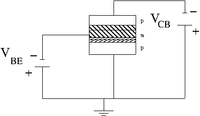 |
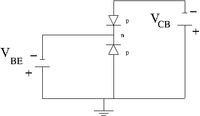 |
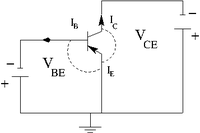
|
| pnp bi-polar transistor | Equivalence circuit | Circuit diagram |
In the Junction field effect transistor you have a single charge carrier with the minority charge carriers forming a choke point for the majority carrier current flow. It is similar to "pinching" a garden hose when water is flowing through it.
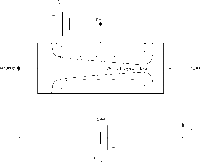 |
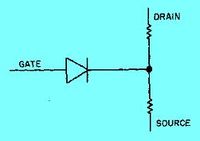 |
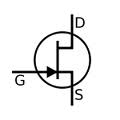
|
| JFET | Equivalence circuit | Circuit diagram |
The semiconductor material of the gate is the opposite of the channel. Here the n-p (or p-n) junction is between the gate and the channel.
The JFET operates by reverse biasing the gate-channel junction (diode) so the gate current doesn't flow in the direction indicated by the circuit diagram symbol. This means that the current through the gate is small (nAmps). As a result the input impedance looking into the gate is high (M) for the equivalent circuit.
MOSFET
MOSFET Metal-Oxide-Semiconductor Field Effect Transistor